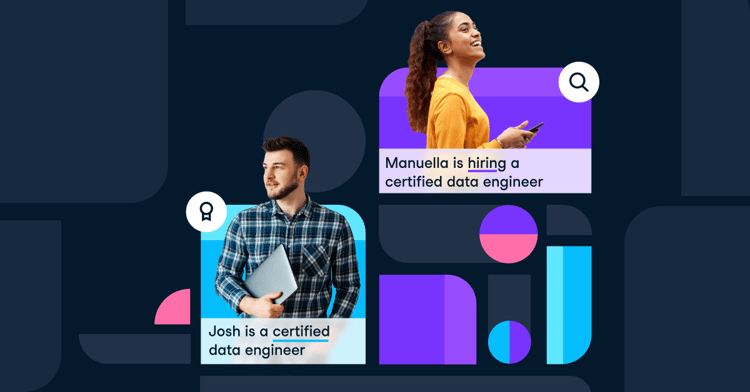Track
Apache Kafka is an open-source platform designed to handle streaming data. Imagine it like a high-speed messaging system for sending and receiving messages and events from various systems. Large businesses, such as LinkedIn and Netflix, even rely on Kafka to manage their real-time data streams.
In this article, I will provide an overview on Apache Kafka and I will also guide you through the process of obtaining a Kafka certification, which is likely to provide a huge positive benefit to your career. If you are totally new to Apache Kafka, read our blog post, Apache Kafka for Beginners: A Comprehensive Guide, which covers everything from the basics to advanced features.
Importance of a Kafka Certification
Apache Kafka certifications are extremely important because they are highly relevant and widely used. Let's take a quick look at specific use cases in different industries.
Use cases in real-time data processing
- Log Aggregation: Log aggregation is the collection of logs from various sources, such as servers, databases, and devices, to a central location for analysis, monitoring, and troubleshooting. Kafka enables these logs to be collected and processed in real-time for immediate detection of issues and rapid response.
- Data Aggregation: Due to Kafka’s architecture, real-time data is ingested and aggregated. This makes it easy for the application to work with the data immediately, and it also decouples data producers from consumers to ensure flexible data processing workflows.
- Stream processing: As data is continuously ingested and processed, Kafka replication ensures that streams are available and durable even if some brokers fail. It also integrates seamlessly with various streaming frameworks, providing an ecosystem for building complex streaming applications.
Role of Kafka in various industries
- Banking corporations like ING Bank use Apache Kafka for real-time fraud detection, cybersecurity, and regulatory compliance. It’s also used in stock trading applications, investment banking platforms, and drawing security price insights.
- Walmart uses Kafka to recommend products to customers and manage inventory, deliveries, and supply chains. They also use it to get real-time insights into customer traffic.
- Apache Kafka is used in healthcare to continuously monitor patients' vital data and allow medical response to critical issues with system alerts.
- Uber uses Kafka to match drivers and customers on a large scale and provide real-time tracking to optimize ride-sharing and taxi reservations.
- Twitter uses Apache Kafka for content recommendations to millions of its users and offers customized feeds to each user based on their preferences.
- Netflix also uses Kafka to optimize user experience by providing movie recommendations based on their watch history.
Overview of Kafka Certification Programs
Before looking at each certification, let's talk a bit about the role of Confluent. Confluent is a cloud platform built on Apache Kafka with additional tools and services to make Kafka easy to use and more powerful. The platform includes features like.
- Confluent Control Center for monitoring and managing Kafka
- Confluent Schema Registry for managing data schemas
- Confluent KSQL for stream processing with SQL-like queries.
Because Confluent is an enterprise-ready solution built on top of Kafka, it offers various training guides and certifications to developers and organizations working with Apache Kafka and Confluent. Confluent is worth knowing because there are a lot of companies using Confluent.
There are different certifications depending on your role and level of experience with Kafka. The Confluent Certified Developer for Apache Kafka (CCDAK) certification focuses on the knowledge of the platform needed to develop applications that work with Kafka. The Confluent Certified Administrator for Apache Kafka (CCAAK) certification focuses on Kafka cluster management by administrators.
Confluent Certified Developer for Apache Kafka (CCDAK)
CCDAK certifies developers' skills in designing and implementing applications using Kafka. It covers application design, development, and deployment/testing. Candidates need 6-12 months of experience with Confluent products and basic knowledge of Java, Python, or RESTful interfaces. The exam costs $150, has 55 questions, and is valid for two years.
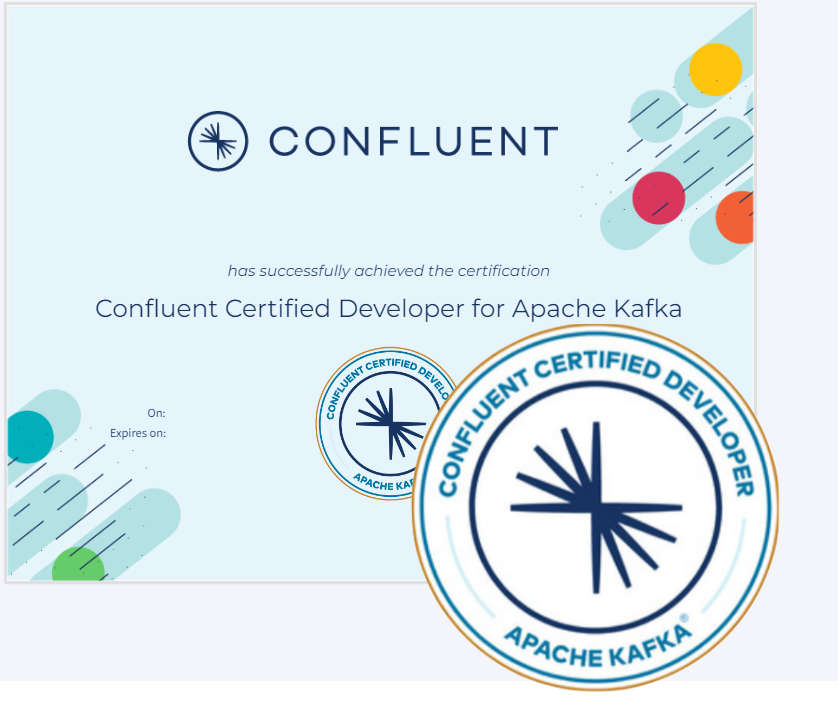
CCDAK badge and certification. Source: Credential
Confluent Certified Administrator for Apache Kafka (CCAAK)
CCAAK focuses on Kafka cluster management, including configuration, performance optimization, and security. It requires 6-12 months of experience with Confluent Kafka and knowledge of network technologies. The certification, costing $150, includes 55 questions and is valid for two years, targeting DevOps engineers.
 CCAAK badge and certification. Source: Credential
CCAAK badge and certification. Source: Credential
Comparison of Confluent Kafka Certifications: CCDAK vs. CCAAK
| Feature | CCDAK | CCAAK |
|---|---|---|
| Focus | Developing Kafka applications | Managing Kafka clusters |
| Skills Tested | App Design (40%) Development (30%) Deployment/Testing/Monitoring (30%) |
Fundamentals (15%) Cluster Management (30%) Security (15%) Integration (40%) |
| Product Prerequisites | 6-12 months with Confluent products Knowledge of Kafka apps, KSQL, Avro Kafka Connect integration |
6-12 months with Confluent Kafka Knowledge of Confluent platform components |
| General IT Prerequisites | Java/Python/REST Linux/Unix Network technologies Distributed systems Stream processing |
Linux/Unix Network technologies Distributed systems Security mechanisms |
| Target Audience | Data Engineers, Big Data Architects | DevOps Engineers |
| Cost | $150 | $150 |
| Exam Format | 55 multiple-choice questions, 90 minutes | 55 multiple-choice questions, 90 minutes |
| Validity | 2 years | 2 years |
| Resources | Developer Skills, Bootcamp, Study Guide | Admin Skills, Fundamentals, Study Guide |
Benefits of Getting a Kafka Certification
Achieving a Kafka certification offers numerous benefits that can significantly impact your career and professional standing. Let’s take a look.
Career advancement
As the volume of data that companies handle increases, there is a need for developers who can handle such data using streaming platforms like Kafka. This leads to a pressing need for certified Kafka developers. For example, in places like the UK, the number of jobs citing Kafka is around 1,196, and the median annual salary of Kafka professionals is 75,000 pounds and can go as high as 120,250 pounds.
Skill validation
Getting a Confluent Kafka certification verifies your understanding of Apache Kafka and your ability to build robust architectures that enable real-time analytics and handle complex distributed systems. A Kafka certification shows your commitment to continuous learning and indicates your awareness of industry standards and practices. Getting certified enhances credibility and trust from employers and increases their confidence in your abilities.
Industry recognition
Tech giants such as Netflix, Spotify, and Uber use Kafka due to the high amount of data they have to deal with daily and as one of the most popular distributed streaming platforms, this makes it a demanding skill. Getting a certification from Confluent, the original creator of Apache Kafka, signifies a high level of expertise in Kafka. Systems out there have already been built on Kafka; hence, there is a need for developers who can maintain these systems.
Networking opportunities
Adding a Kafka badge on your social media platforms, such as LinkedIn, increases your visibility to the Kafka community, attracting like-minded professionals and employers or clients. Getting Kafka certified also means you can join or lead various Kafka user groups and meetups to share knowledge and collaborate on projects. Kafka certification can also open the doors to speaking opportunities at conferences and webinars, increasing your visibility in the Kafka community.
How to Prepare for Kafka Certification
Let’s now take a look at how to prepare for the test.
Step 1: Get ready for the exam
Confluent provides the Confluent Fundamentals Accredited exam designed to validate your knowledge of fundamental concepts of stream processing, this exam is free and takes one hour to complete. Once you pass the exam, you are provided a digital badge to share on LinkedIn. You can take this to test your foundation knowledge of Confluent and Kafka before considering taking any of the Confluent Kafka certifications.
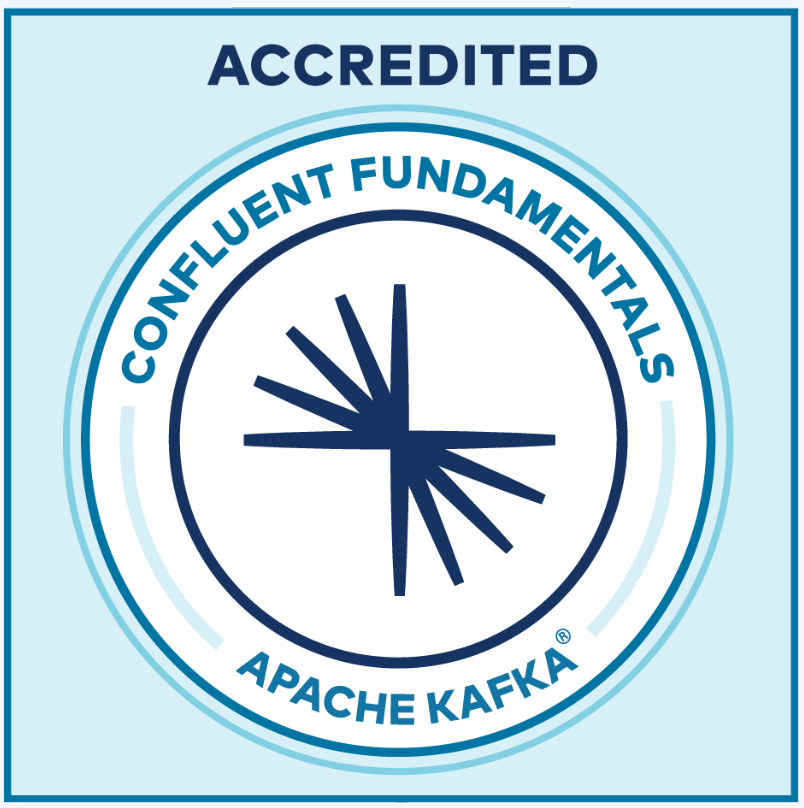
Confluent Fundamentals accreditation badge. Source: Credential
Confluent provides learning resources you can access after signing up on their training platform. The platform offers live instructor-led classes, self-paced learning, and private live classes for you to choose based on your learning style. The platform provides study guides and learning material for each certification program.
Ensure you also have hands-on experience with Kafka. This will help a lot in answering practical scenarios in the exam. Consider also taking mock exams to understand how the questions are set and identify your knowledge gaps.
Contact Kafka professionals who have taken the exams for advice and mentorship on how to ace the exams, you can join various Kafka meetups or groups for additional resources, you might get lucky and meet someone who wants to write the exam, and you can pair study together.
Confluent training platform. Source: Confluent
Step 2: Sign up for the exam
On the Confluent training platform, you can register for an exam after signing up by going to Certification on the menu to purchase the certification you are going for and following these steps to redeem the license key to schedule your exams.
You are expected to complete the exam within 12 months from the date of purchase and canceling the exam within 5 days of the appointed exam date is not eligible for a refund.
If you are taking the exams remotely, ensure your PC is working perfectly well before starting the exam using the System Readiness Check, ensure also that the name used to sign up on the Confluent training portal matches your Government ID.
For in-person exams, ensure you are familiar with the testing center and are expected to come with your Government ID matching all your credentials on the training portal.
Certification page on the Confluent learning platform. Source: Confluent
Step 3: Get your results
Upon successful submission, your results will immediately appear on the testing screen. You will receive an email with the steps to access the Confluent digital badges and your certification credentials.
Tips for Passing the Kafka Certification Exam
Time management
Managing your time effectively is one of the factors that can help you pass the Confluent certification exams. Try to answer short and easy questions first before going for the difficult ones. If you finish the exam and have time left, use the remaining time to crosscheck the questions again to catch questions you might have missed or answered incorrectly.
Understanding concepts
Don’t just memorize concepts. Build a solid understanding of how Kafka tools work and communicate with each other. You should understand why and when a specific Kafka tool is used.
Practical application
The use of Apache Kafka and Confluent is all about practical experience. Even though the exam is MCQ, there will be questions that will test your practical understanding, ensure you build Kafka projects, and collaborate with experts to have hands-on experience. Also, familiarize yourself with Confluent and Kafka use cases to understand various designs and architectures.
Career Opportunities with Kafka Certification
Job roles requiring Kafka
As a Kafka professional, you get to work with streaming data daily, although how you use Kafka to handle data depends on your role. The various roles that require the knowledge of Kafka are:
- Data Engineer: Data engineers are specialized professionals who design, build, and maintain infrastructures for collecting, generating, storing, and processing data. Data engineers use Kafka to get real-time data from sources such as web applications, mobile apps, or logs and process in real-time. They also use Kafka to build data pipelines and feed data to analytics and monitoring systems for real-time insights and alerts.
- Big Data Architect: Big data architects are professionals responsible for designing, building, and managing large-scale data processing systems. They create the blueprint for big data solutions using tools like Kafka to handle data storage, processing, and analysis.
- DevOps Engineer: The DevOps engineer's role is to streamline the processes between software development and IT operations. They ensure the efficiency, reliability, and scalability of software delivery and infrastructure management. They also utilize Kafka as a central component for streaming events between microservices, applications, and systems and set up monitoring and alerting systems to track Kafka clusters.
The table below summarizes which Kafka certification is best for the developer and administrator roles.
| Role | CCDAK | CCAAK |
|---|---|---|
| Data Engineer | Required | - |
| Big Data Architect | Required | - |
| DevOps Engineer | - | Required |
Industries needing Kafka-certified professionals
Kafka is used by over 80% of Fortune 100 companies, such as Goldman Sachs, Adidas, Airbnb, Spotify, Shopify, and many more. Most of these companies deal with big data, which only distributed streaming platforms can handle. These organizations seek individuals with Confluent Kafka certification in their job postings. The following is an example of a job posting on Uber that is looking for a Staff Software Engineer role with knowledge of Kafka as a requirement.
Job posting qualifications for a Staff Software Engineer role at Uber. Source: Uber Careers
Final Thoughts and Additional Resources
In the age of artificial intelligence and machine learning, immediate action on real-time data is needed. More and more often, certifications are becoming essential components of job applications. I am encouraging you to go for a Kafka certification because it is an investment that will pay in the long run.
Recommended reads
- Apache Kafka documentation
- Confluent documentation
- Apache Kafka for Beginners: A Comprehensive Guide
- Kafka Partitions: Essential Concepts for Scalability and Performance
- Flink vs. Spark: A Comprehensive Comparison
Kafka communities and forums
Get certified in your dream Data Engineer role
Our certification programs help you stand out and prove your skills are job-ready to potential employers.
Experienced data science instructor and Biostatistician with expertise in Python, R, and machine learning.
Frequently Asked Questions
What is the difference between Apache Kafka and Confluent?
Apache Kafka is a distributed streaming platform while Confluent is a cloud platform built on Apache Kafka to expand its capabilities on an enterprise level. Confluent also offers additional services, such as training and certification, to Kafka developers.
What are the available Kafka certifications and their relevance?
Confluent offers two Kafka certifications, Confluent Certified Developer for Apache Kafka(CCDAK) and Confluent Certified Administrator for Apache Kafka(CCAAK). CCDAK certifies knowledge of Kafka architecture and applications on streaming data, while CCAAK tests the administrator's knowledge of the operation and monitoring of Kafka clusters.
How much do the exams cost?
Each Kafka certification exam costs $150.
What is the format of Kafka certification exams?
All Confluent certification exams consist of 55 multiple-choice questions to be answered in 90 minutes.
For how long is my Kafka certification valid?
All Kafka certifications are valid for two years.


